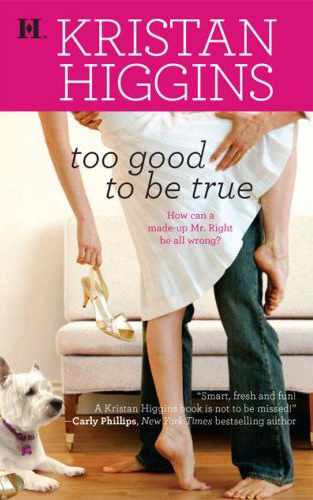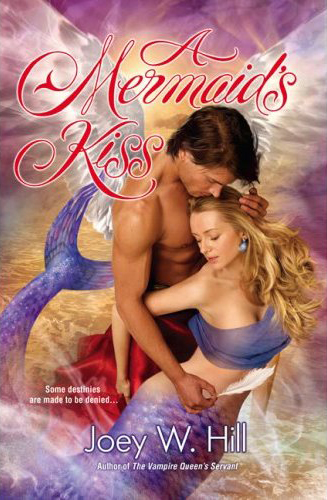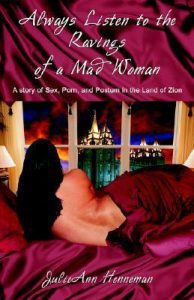There were the 3 Georgian historicals I liked, but thought were fairly flawed and Almost a Gentleman, the one erotic Georgian I couldn’t finish. I did, however, really enjoy The Bookseller’s Daughter and The Slightest Provocation, so I’ll give the author the benefit of the doubt no matter what.
Then there are the ones on the sidebar to the right, some of which are romance. Under My Skin by Jenny Gilliam, which I liked enough that I only stopped reading when I had to tend to various obligations, like Tax Deductions 1 and 2. And congrats to her for its sale to Amira! (A little late on that congrats, Jenny. Mea culpa.)
 Catch of the Day by Kristan Higgins, which made me bawl and laugh and cringe in vicarious embarrassment, which was only cute/sweet because it wasn’t happening to me. Also, her Just One of the Guys, which was good but not as heartwrenching as Catch of the Day. Her first effort, Fools Rush In (which I actually read in 2009, sorry!), I found at a thrift store for a quarter and damme if that wasn’t a bargain! All 3 books are written in first person, though Catch of the Day and Just One of the Guys are in present tense (I like!) and Fools Rush In was in past tense. (I crack myself up.) You must have a box of Kleenex for these books. I remember this author’s name. For me, that’s like saying her books are auto-buy and lo and behold! She’s got a new title, Too Good To Be True. Honestly, I think she’s more what people call “women’s fiction” because she seems to focus more on the heroine’s journey than the romance. Word of warning: Don’t glom this author.
Catch of the Day by Kristan Higgins, which made me bawl and laugh and cringe in vicarious embarrassment, which was only cute/sweet because it wasn’t happening to me. Also, her Just One of the Guys, which was good but not as heartwrenching as Catch of the Day. Her first effort, Fools Rush In (which I actually read in 2009, sorry!), I found at a thrift store for a quarter and damme if that wasn’t a bargain! All 3 books are written in first person, though Catch of the Day and Just One of the Guys are in present tense (I like!) and Fools Rush In was in past tense. (I crack myself up.) You must have a box of Kleenex for these books. I remember this author’s name. For me, that’s like saying her books are auto-buy and lo and behold! She’s got a new title, Too Good To Be True. Honestly, I think she’s more what people call “women’s fiction” because she seems to focus more on the heroine’s journey than the romance. Word of warning: Don’t glom this author.
Eva Gale’s short stories “Desperate Measures” and “Scorpion’s Orchid” (post-apoc/steampunk). Loved both, though not crazy about short story format (that’s my own failing); the short form worked better in “Scorpion’s Orchid.” And, oh, you must, must, must, must, MUST go catch Eva’s free reads. “The Seduction of Gabriel Stewart” was wonderful and part of what I want to read, as both a spiritual and sexual woman: a smooth meld of the erotic and the faithful.
Susan Elizabeth Phillips’s Natural Born Charmer. Of course I read it straight through, but SEP’s losing her grip on me, I think. Not sure why because she’s got a book on my keeper shelf and in this one, though the heroine was an artist, she wasn’t flighty and she was quick to catch on to what was going on around her, so I was good with that.
Patti Shenberger’s The Captain’s Wench. I’m a sucker for seamen (heh) stories, but this story suffered from some logical fallacies like the fact that the heroine just accepted the strange man in her house was a ghost and bantered with him as if he were an old friend. Like there’s really nothing strange about that situation at all. It was a short story/novella, so it could’ve been a word length requirement problem.
I read The Dragon Earl, which I really enjoyed. The first chapter on the author’s website got me enough that I remembered it when I saw it at Wal-Mart.
Forbidden Shores didn’t impress me. I never felt like any of the characters actually loved each other and that the HEA (happily ever after) was forced.
The following has spoilers. Highlight the blank spaces to read.

Last but not least, this: A Mermaid’s Kiss by Joey W. Hill. I don’t know what to say about this because I’m conflicted in so many directions, yet it’s stuck with me ever since I read it. I hesitate to do a review on it, but here I am 3 months later, still thinking about it. It’s supposed to be erotic. It’s not. The reasoning for the sex between the hero and heroine is flimsy at best, though I wasn’t any more put off by the more, ah, unusual aspects of it than I was by any of the other sex scenes, none of which were necessary to the story. (The hero and heroine have sex with her in mermaid form and her in pixie form.) I also didn’t like the fact that the heroine had so many configurations (mermaid, pixie, human). The sex just … annoyed me. Why? Because I thought this was a terribly spiritual book with underpinnings of faith (some amalgam of Christianity and goddess mythos) and a keen insight on human behavior. In a lot of ways, its underlying theme reminded me of Dogma, although in a gut-wrenching way and not a satiric way. The sex got in the way of the character development (and worldbuilding) and pulled me out the story every single time. And it wasn’t even good sex.
It took me a while to write this post and 2008 was a busy year, but the ones I forgot must not have made an impact on me.

 Always Listen to the Ravings of a Mad Woman [dead link]
Always Listen to the Ravings of a Mad Woman [dead link]